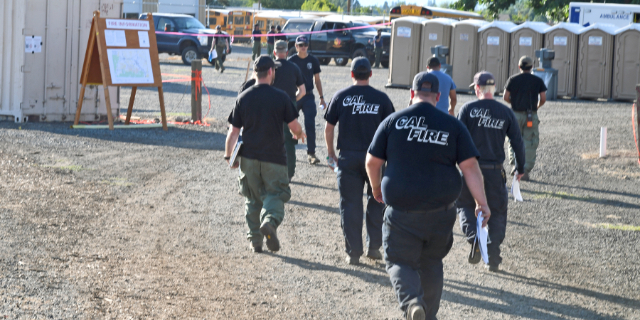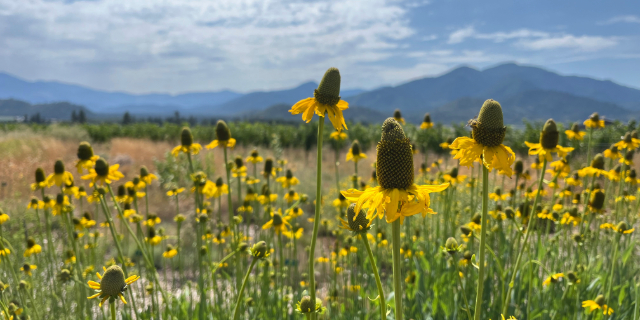Rusted Gate Farm is an open-air laboratory
Published 6:00 am Wednesday, March 8, 2023

- Megan Capp, garden manager, walks Monday through rows of covered lettuce starts at Rusted Gate Farm outside Central Point.
A few miles beyond downtown Central Point, past a tangle of suburban streets and down Upton Road, sits Rusted Gate Farm. The property could easily be mistaken for a typical farm, but the nonprofit works more like an open-air laboratory.
Trending
“Small farmers can’t afford to take a square inch out of their farm to do an experiment,” said Jo Ann Shannon, executive director of Rusted Gate Farm.
Most small farms get by on near-poverty wages, unable to lower prices and struggling to convince consumers to pay what it costs to raise their crops, said Megan Capp, gardens manager.
Three years ago, Rusted Gate lost every apple in its orchard to an airborne blight. That’s the nature of agriculture, Shannon said. The constant threat of unpredictable disasters combined with inflation keeps most small farms skirting the edge between ruin and survival, which makes trying new things a risk and a luxury — even if a new product or a different practice could mean higher yields or healthier fields.
Trending
But Rusted Gate isn’t dependent on its crops for profit. Working off grants, donations and proceeds from its farm stand, the nonprofit can afford to try new things and share its results with other farms, Capp said.
Monday afternoon, Capp and the rest of the Rusted Gate staff stood in a 7,000-square-foot garden that supplies Rusted Gate’s farm stand. Lines of little plants were just beginning to grow as spring breaks out of winter.
The farm stand tests what local customers want, Capp said. The most popular items are salad greens, but this season, Capp is preparing to grow a variety of nightshade favorites — tomatoes, eggplants, tomatillos and peppers. She’ll grow 12 varieties of tomatoes to see which varieties do well in this climate and the shop.
The greens and nightshades are “shiny objects,” Capp said, hopefully attracting a base of return customers who might become interested in the farm’s biggest crop and the source of its largest current experiment — beef.
“These are our happy cows,” said Dave Picanso, farm and ranch manager.
He smiled as he gestured toward a long dirt road flanked on either side by cattle enjoying piles of hay. For now, the cattle are eating nothing unusual. Hopefully that will change next year.
“We’re growing Kernza this year for the first time; it’s a hybrid crested wheat. We’re growing it for hay. Eventually, we might even try it as a pasture crop,” he said.
The grain was developed from intermediate wheatgrass by the Land Institute in 2008 and trademarked in 2009, according to Kernza.org. Kernza’s greatest promise is its perennial growing habit, meaning the grass can live for two years or longer without needing to be resown. Kernza has been used in small-scale projects for human consumption, in products like bread and beer. But it’s unknown whether cows will eat it.
“Our hope is that we could get away from having to farm annually for the cow hay. Perennial hay means less fuel, less labor. It’s also better for the land and the soil if we’re not tilling it every year. But we don’t know how palatable it is yet,” he said.
The cows batted their long eyelashes and stared in genteel fascination at the strange bipeds. Picanso pointed to full udders, recognizing a new mother recently calved. The cattle are calving this time of year. In the morning, he said, the calves come running and frolicking through the feed area.
In the wide oak savanna where the nonprofit’s Angus-Wagyu cattle were fattening, it was quiet. The air was filled with the soft earthy scents of hay, mud and the smoke of burn piles.
“We try to let ’em be as natural as they can be but yet be taken care of,” Picanso said. “This right here, this is the Hilton. A lot of cows don’t have this. We’re fortunate to be able to do this for ’em.”
Rusted Gate’s projects revolve around the pragmatic axiom “best practices,” said John Souza, programs director. Best practices can change depending on the micro-climate of an individual farm, like Jacksonville compared to Ashland. But it can also be different depending on the scale and intentions of an individual farm.
“We have very traditional farmers, and very new farmers, as well. And kind of a mix of everybody in between,” Souza said. “We have people like Dave (Picanso) — he’s been farming in the valley for 40 years, he knows how to grow crops. Then our farm and garden staff, they know how to get high capacity yields out of small gardens.”
The nonprofit’s list of ongoing projects is short because the organization is still young.
“It started with two sisters,” said Souza.
Christy Walton and Rachel Hall were concerned as they watched farmland around Central Point being consumed by hemp farms or housing. A couple of nearby farms went up for sale, and the sisters bought the land. Once they had amassed several hundred acres this way, in 2019 the nonprofit was formed to make the best of these parcels.
Rusted Gate began to grow in 2020, Shannon said. But the pressures of the pandemic kept them limited. Their greatest success was a free U-pick flower garden where locals — particularly nurses and young families — came for a little relief during the pandemic lockdown.
This limited beginning suited their purposes, she said. The first goal of the organization was weaving itself into the local farming community.
In all their projects to come, Souza said, the organization doesn’t want to come to the community with a top-down approach. They want to get to know their neighbors and earn their respect.
“To find some of these problems, you’ve got to experience it. You can’t just go in and say we’re going to throw a bunch of money at it. You got to go through that experience so you can really talk intelligently about it. We want to feel the pain and see what it’s like,” Souza said.
“Then you can really problem-solve.”









